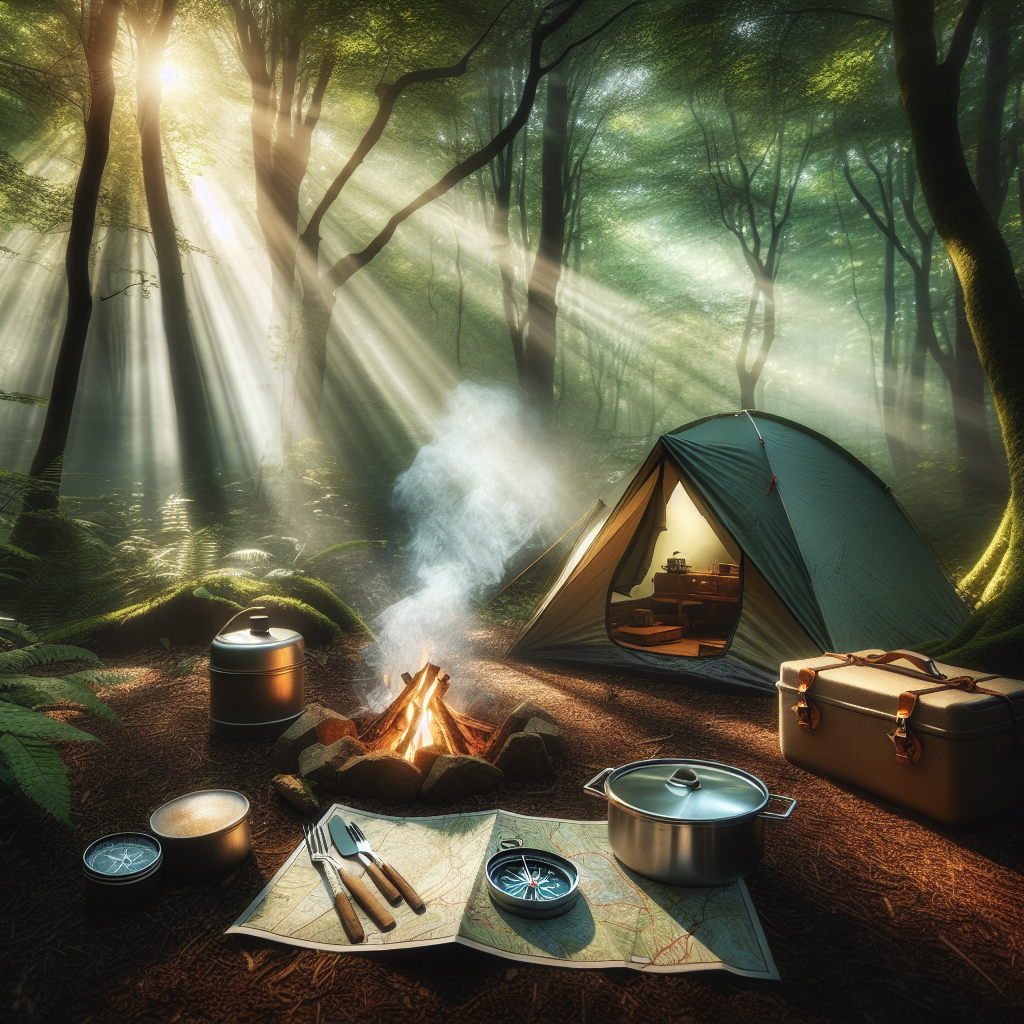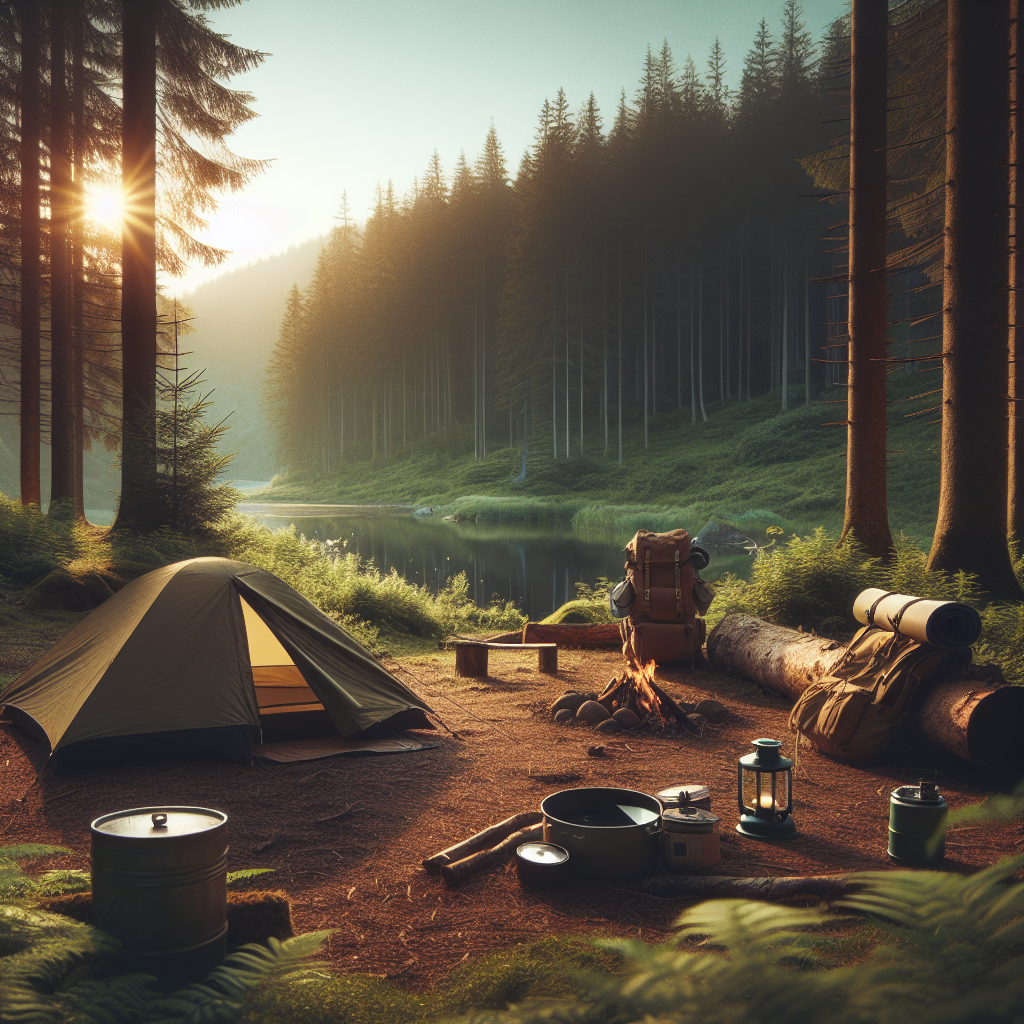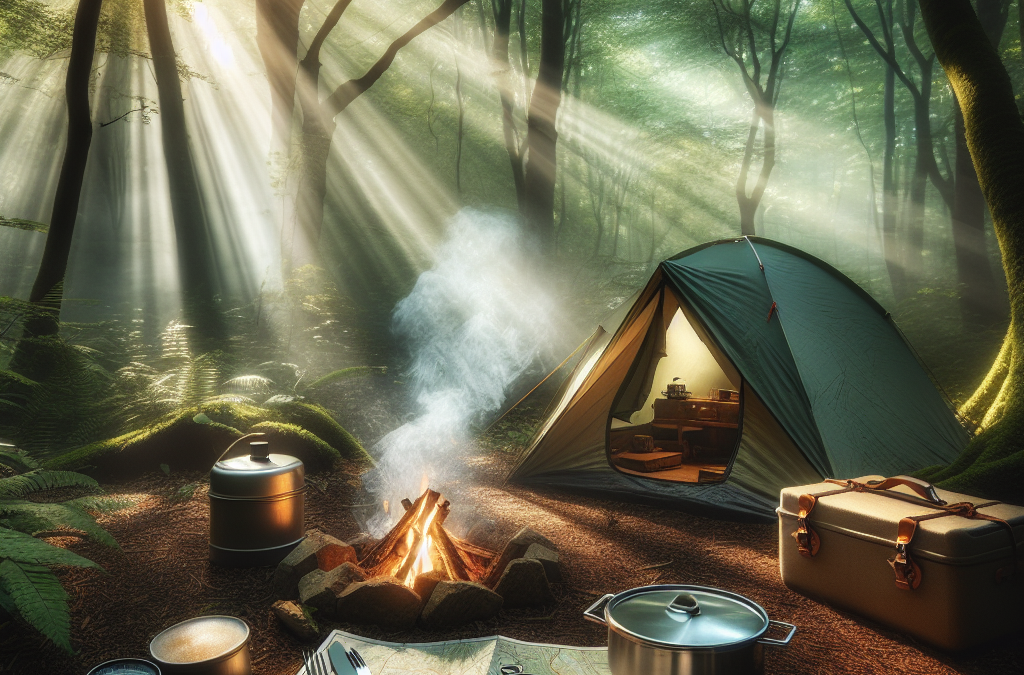Embrace the solitude of the wilderness and seize the opportunity to contend solo with nature’s elements. As you sprinkle your daily grind with the thrill of managing your campfire, establishing your tent, and cooking your food single-handedly, the article “Solo Camping: Tips and Safety for the Lone Adventurer” offers a trove of helpful advice and essential safety measures. This comprehensive guide aims to equip you, the solitary camper, with the requisite knowledge and skills to make your independent outdoor exploits not only feasible but thoroughly enjoyable.

Choosing the Perfect Camping Spot
As a solo camper, your camping spot is arguably the most important factor in your trip. It’s not just a place to sleep, but your base of operations. Choosing the right spot can be daunting but with the right tools and considerations, you can find the right place for your adventure.
Researching Locations
The first step in choosing the right camping spot is research. Look for locations that are well-traveled, have clear signage, and have been marked as safe for camping. The internet, social media platforms, and camping guides are your best friend in this process. Check the amenities offered, such as water sources, toilet facilities, and nearby hiking trails. Research not only helps you find a great place, but also sets the right expectation for your journey.
Assessing Your Skill Level
Your camping location should align with your skill and comfort levels. If you’re a beginner, start with developed campgrounds or regions that have guides and facilities. As you gain experience, you may want to explore more secluded, less-developed areas. Don’t rush your growth as a camper. Find joy in the learning and mastery process and let that guide you to the perfect place.
Checking Weather Conditions
Weather is one of the most unpredictable elements of any outdoor adventure. Make sure to check the forecast for your chosen location. Prepare for possible fluctuating temperatures, rain, storms, or windy conditions. Poor weather doesn’t have to ruin your trip, but knowing what to expect helps you pack and prepare the right gear.
What to Pack for Solo Camping
Packing for a solo camping trip can be a challenge. You need to balance the need for survival essentials without overloading your pack.
Choosing a Quality Tent
As the saying goes, your tent is your temple when you’re camping. It provides shelter, a place to sleep, and protection from the elements. When choosing a tent, consider its durability, weather resistance, and its size. It should be light enough for you to carry, but strong enough to withstand the conditions.
Survival Kit Essentials
A survival kit is a necessity. It should include a first aid kit, a multi-tool, a compass, a map, and basic fire-starting materials. You may also want to include items such as a whistle, sunglasses, sunscreen, and emergency blankets.
The right Clothing Choices
Wear weather-appropriate clothing. Layer your clothes so you can adjust to changing temperatures. Also include a reliable pair of hiking boots, gloves, hat, rain gear, and a bright garment in case you need to signal for help.
Setting up Camp
Setting up camp is not just a routine task, it’s a skill that every solo camper should master. The right set-up can make your adventure comfortable and safe.
Choosing the Best Spot
Look for a spot that is flat, clear of debris, and away from any hazards such as loose rocks, dead trees or low points where water can accumulate. It should also be at a reasonable distance from water sources to avoid attracting wildlife.
Safe Shelter Assembly
Start by laying out your tent. Secure it to the ground with stakes. Ensure that it’s fully zipped to keep out bugs and small animals.
Setting up a Fire Pit
Choose a spot for your fire pit that’s downwind and away from your tent. Clear about two feet of space around the site of all grass, leaves and rocks.
Campfire Safety
It’s important to practice fire safety to prevent accidents. This will keep not only you safe, but also the wildlife and forest surrounding you.
Proper Fire Starting Techniques
For starting a fire, gather tinder, kindling, and firewood. Place the tinder in a small pile, ignite it, then slowly add the kindling. As the fire grows, gradually add larger pieces of firewood.
Fire Management and Safety Tips
Never leave a fire unattended. Have a source of water or a shovel nearby in case you need to extinguish the fire quickly.
Putting Out Your Fire Safely
When you’re finished with your fire, douse it with water, stir the ashes, and douse it again. Only leave the site when you’re sure that the fire is completely out.

Food and Water
Staying nourished and hydrated is key to any camping trip. Careful planning will ensure that you have the right amount of food and can access clean water.
Planning Your Meals
Plan meals that are quick and easy to prepare. Make sure you pack a day or two’s extra food in case you need to stay longer than anticipated.
Safe Food Storage
Store food in airtight containers and hang it in a tree at least 10 feet off the ground and 4 feet away from the trunk to keep wildlife out.
Water Purification Systems
Boiling water is the safest way to purify it. A small camping stove and pot can be used for this. Alternatively, there are also portable water filters and water purification tablets available.
Solo Adventure Activities
There’s more to camping than just sitting around. Camping activities can bring mental, spiritual and physical satisfaction.
Hiking and Trekking
Most campsites have nearby trails for you to explore. These provide a great opportunity for exercise and sightseeing.
Capturing Your Adventure: Photography Tips
Taking photos is a great way to keep memories of your trip. Try waking up early to capture sunrise or staying up late for the clear, star-filled night skies.
Mindfulness and Meditation Experiences
Solo camping is the perfect opportunity for some introspection. Meditating, doing yoga, or simply sitting by the fire can provide a great sense of peace.
Wildlife Preparedness
Knowing the wildlife of your area and how to interact with them will greatly improve your camping experience.
Researching Local Wildlife
Understand the wildlife that inhabit the area and how you should react if you encounter them.
Avoiding Attracting Animals to Your Campsite
Avoid attracting animals by storing your food properly and by using unscented toiletries and repellents.
What to do in an Encounter
If you encounter wildlife, remember to stay calm, speak loudly and firmly, and never run away.
Emergency Situations
In any outdoor activity, it’s necessary to prepare for emergencies.
Personal Safety Systems
Always let someone know where you’re going and when you’ll be back. Carry a whistle, a torch, or a glow stick, as well as a personal locator beacon for extreme cases.
Emergency Contact Planning
Prior to your trip, write down emergency phone numbers such as park rangers or rescue centres.
Administering Basic First Aid
Learn basic first aid techniques like how to treat minor injuries, insect bites, and allergic reactions.
Leaving No Trace
The concept of “leave no trace” is one of the most important guidelines in camping.
Importance of Leaving No Trace
Preserving the environment is crucial to ensuring that others can enjoy the same beauty of the wilderness we enjoy today.
Clean Up and Waste Disposal
Ensure you pack all your trash out of the site when you leave. Incase there are no toilet facilities, dig small cat holes six to eight inches deep at least 200 feet away from streams or lakes.
Minimizing Your Impact on the Environment
Stick to trails and camping spots to protect the undergrowth and wildlife habitat.
Benefits and Challenges of Solo Camping
Solo camping tests your abilities, knowledge, and agility. It’s a mix of challenges and rewards.
Personal Growth and Self-Reliance
Overcoming challenges and trusting in your own abilities promotes personal growth.
Loneliness and Isolation
Solo camping could lead to bouts of loneliness and isolation. If you feel lonely, bring along a book, journal, or any hobby to keep you occupied.
Overcoming Fear and Uncertainty
Being alone can stir feelings of fear and uncertainty. Feel the fear, and do it anyway. Soon enough, with each trip, these feelings will subside.
In conclusion, solo camping can be an exhilarating experience if you approach it with due respect and preparation. It offers a chance for introspection, connection with nature and personal growth. So go forth, enjoy the silence, appreciate the stars, conquer the challenges and go back home with great stories of your solo adventure!

